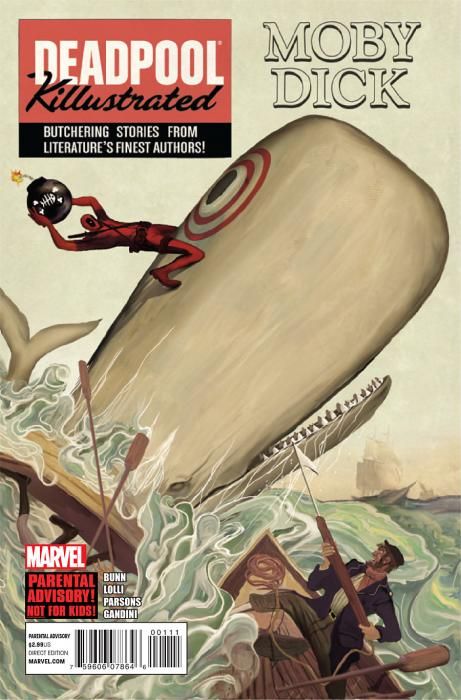Here's the scene: Deadpool has just finished killing the Marvel Universe. "Deadpool Killustrated" #1 by Cullen Bunn and Matteo Lolli shows what happens next. Having uncovered the true, fictional nature of his own existence, Deadpool sets off on a new quest: to kill fiction itself in the hope of wiping out all superheroes forever. And with that, events proceed according to their course.
There's more than a hint of "Marvel Zombies" in the way the "Deadpool Kills..." joke has been hammered home in previous series with little variation. The upside is that if you liked it then, you'll probably continue to like it -- but if you stopped laughing a while ago, there's nothing here that's going to get those chuckles flowing again.
The problem is that there's not much warmth or specificity of material in "Deadpool Killustrated." Making a "Jaws" crack over Moby Dick is the extent of its engagement, and while there's a lot you could do in subtext with the idea that a superhero is "killing" classical literature, this comic seems content to be strictly text: See Deadpool appear in a scene from classic literature, kill something, then move on. Rinse, repeat. There's no real commentary, just grinding, joyless repetition of an idea.
It doesn't help that Bunn seems more interested in justifying the McGuffin than using it. Half of the comic is dedicated to getting us up to speed with the plot, with a particularly wordy few pages devoted to setting up the "ideaverse", as well as how and why Deadpool should move through it. The concept of metafiction shouldn't require this much tell, especially when the show is so much easier.
Lolli's artwork is (aside from Del Mundo's cover) the strongest part of the book, with the representations of Moby Dick standing out as particularly good. Beyond that, it's typical stuff. Executing the story, but rarely elevating it. That's not to say that either Bunn or Lolli are technically under-performing - the writing is a coherent implementation of the story. The artwork is entirely serviceable, even occasionally impressive. So why doesn't the comic work?
Perhaps the problem is simply that "Deadpool Killustrated" is the kind of idea that works best as just that: an idea. As soon as you try to execute it on the page, possibilities collapse, the perfect joke in your head becomes an imperfect telling of the joke. The thought of Deadpool slashing his way through the classics is twice as good as the trudging, mechanical reality of it. There's only the barest hint of a twist in the story, but it can't hope to inspire the attention it needs when set against such wilful absurdity. In the end, this is a comic that needed to be rapid-fire. Instead, it's stuck on automatic.

